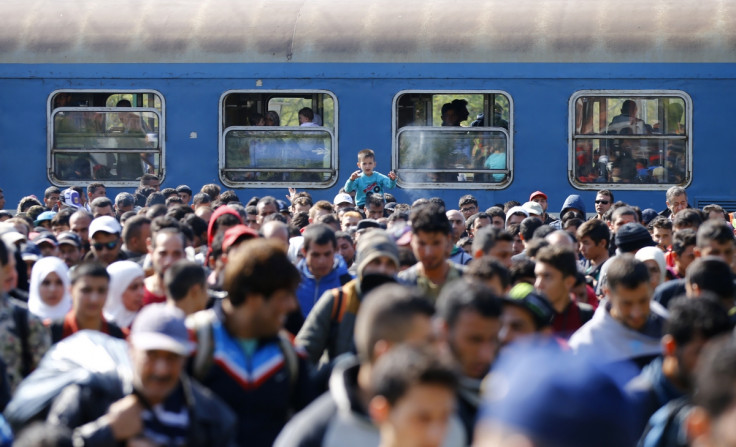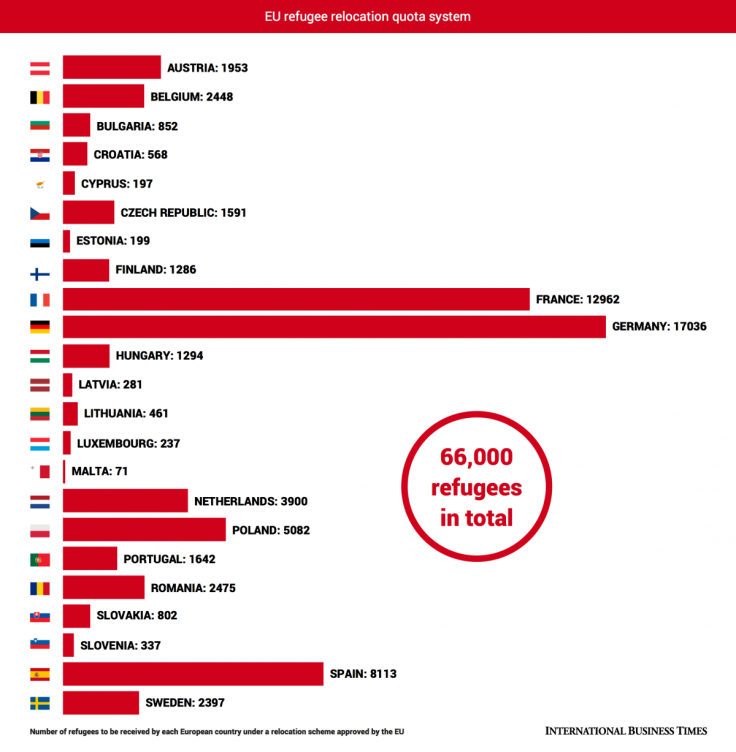Migrant crisis: EU relocation scheme sets country quotas as Slovakia leads revolt

EU leaders meeting in Brussels are to ratify a controversial plan to redistribute 120,000 refugees among member states approved yesterday (22 September), despite the opposition of several countries.
While Finland abstained, Hungary, Romania, Slovakia and the Czech Republic voted against the scheme imposing mandatory quotas, and expressed anger that the decision was taken with a majority vote rather than by unanimous consensus.
Slovakia's prime minister, Robert Fico, claimed he would prefer his country to fall short of European obligations by breaching the measure rather than accepting what he described as a "diktat". He also threatened to appeal to the European Court of Justice.
"We won't implement this decision because we think it can't work," Fico said. "[Slovakia] is not ready to respect it. We always rejected it as nonsense."
Despite the furore caused by the vote, the number of refugees that the member states are required to take in is quite modest compared to the massive influx of migrants and asylum seekers the 28-nation bloc has experienced this year.
EU refugee relocation plan:
The number of refugees each EU member state is required to take in is based on a distribution key calculated on the following factors:
- size of the population (40%)
- total GDP (40%)
- average number of asylum applications over the previous four years (10%)
- unemployment rate (10%)
More than 467,000 people reached European shores via sea since January, according to the International Organization for Migration (IOM). The overwhelming majority have arrived in Greece (337,000) and Italy (127,000), which, as first ports of entry, under current EU rules have a duty to process all asylum applications and accept successful claimants.The quota system aims to ease pressure on their overflowing reception centres.
Hungary, which has also experienced an unprecedented inflow of migrants this year, as thousands made their way up from Greece through the Balkans via land, was also supposed to benefit from the scheme but opted out, as the far-right government of Viktor Orban opposes the measure outright.
Budapest's stance has caused a drastic reduction in the number of refugees that are to be relocated in the short-term under the quota system.
According to the plan drafted by the EU Commission, 54,000 of the 120,000 people to be redistributed were to come from Hungary, with the remaining 66,000 being divided between Greece (50,400) and Italy (15,600).
EU refugee relocation plan in pills:
Only 66,000 refugees will be initially relocated after Hungary dropped out of the scheme.
- 50,400 from Greece; and
- 15,600 from Italy.
Britain will not receive any.
Hungary's drop out put its 45% share on hold. The EU commission said the 54,000 refugees could be relocated from a third member state, if they experience a similarly high migratory influx in the near future, or will be proportionally relocated from Italy and Greece instead, if a year goes by without significant changes.
Thus, only 66,000 refugees are to be relocated over the next 12 months, adding to the 40,000 that EU leaders agreed to redistribute on a voluntary basis in May.
The EU has allocated €780m (£569m, $870m) to support the scheme. Receiving countries will get €6,000 per relocated person, while Greece and Italy are to be paid €500 for each person to cover transport costs.
Refugees will be assigned to the various nations on the basis of a formula that takes into account national income, population size and unemployment rate and the average number of asylum applications received over the previous four years.
Britain will not receive any, as the government decided to use an opt-out clause. It said it will separately take in 20,000 refugees directly from the Middle East over the next five years.
Denmark and Ireland had similar clauses available but offered to help their EU allies instead, pledging to welcome 1,000 and 4,000 asylum applicants respectively.
EU refugee relocation plan:
The mechanism applies to nationals who have an average EU-wide asylum recognition rate of at least 75%, meaning only Syrians, Eritreans and Iraqis will be relocated.
Norway and Switzerland, which are not EU members but are part of the Schengen Agreement, have also pledged their assistance.
Out of the remaining 25 EU member states, quota system advocates France and Germany will receive the lion's share, accepting 12,962 and 17,036 people respectively. The EU's smallest country, Malta, is poised to get 71 refugees.
The most vocal opponent of the scheme, Slovakia, is required to host only 802 people, equal to 0.014% of its population, while the other three countries that voted against, Hungary, Romania and the Czech Republic, will receive respectively 1,294, 2,475 and 1,591 people.

© Copyright IBTimes 2025. All rights reserved.






















